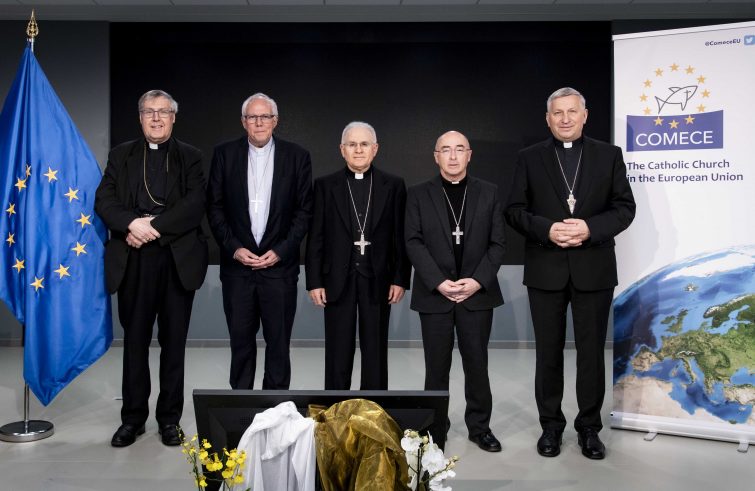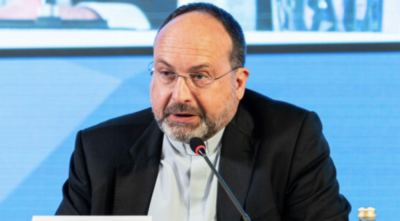
“Abortion can never be a fundamental right. The right to life is the fundamental pillar of all other human rights, especially the right to life of the most vulnerable, fragile ad defenceless, like the unborn child in the womb of the mother, the migrant, the old, the person with disabilities and the sick”, declare the bishops of the Standing Committee of the Commission of the Bishops’ Conferences of the European Union (COMECE) in a statement released on Tuesday ahead of the European Parliament vote on the “Resolution for the Inclusion of the right to abortion in the EU Charter of Fundamental Rights” (2024/2655 RSP), scheduled for Thursday, 11 April. “The promotion of women and their rights is not related to the promotion of abortion”, the bishops remark. “We work for a Europe where women can live their maternity freely and as a gift for them and for society and where being a mother is in no way a limitation for personal, social and professional life.”
“Promoting and facilitating abortion goes in the opposite direction to the real promotion of women and their rights.”
 In their Statement, addressed to the Members of the European Parliament and to the citizens of Europe, the Bishops quote the document “Dignitas Infinita” on human dignity. They state: “The European Union must respect the different cultures and traditions in the Member States and their national competences. The European Union cannot impose on others, inside and outside its borders, ideological positions on the human person, sexuality and gender, marriage and family, etc.” “The Charter of Fundamental Rights of the EU” guarantees such respect and “it cannot include rights that are not recognized by all and are divisive.” “There is no recognized right to abortion in European or International Law – the bishops point out – and the way this issue is treated in the Constitutions and Laws of Member States varies considerably.” The COMECE bishops thus call upon MEPs to duly take into account the preamble of the EU Charter of Fundamental Rights, which states that the Charter must respect “the diversity of the cultures and traditions of the peoples of Europe,” as also the “constitutional traditions and international obligations common to the Member States.” The Statement is jointly signed by the President of COMECE, Msgr. Mariano Crociata, Bishop of Latina (Italy), and by the Vice-Presidents, Msgr. Antoine Hérouard, Archbishop of Dijon (France), Msgr. Nuno Brás da Silva Martins, Bishop of Funchal (Portugal), Msgr. Czeslaw Kozon, Bishop of Copenhagen (Denmark) and Msgr Rimantas Norvila, Bishop of Vilkaviškis (Lithuania).
In their Statement, addressed to the Members of the European Parliament and to the citizens of Europe, the Bishops quote the document “Dignitas Infinita” on human dignity. They state: “The European Union must respect the different cultures and traditions in the Member States and their national competences. The European Union cannot impose on others, inside and outside its borders, ideological positions on the human person, sexuality and gender, marriage and family, etc.” “The Charter of Fundamental Rights of the EU” guarantees such respect and “it cannot include rights that are not recognized by all and are divisive.” “There is no recognized right to abortion in European or International Law – the bishops point out – and the way this issue is treated in the Constitutions and Laws of Member States varies considerably.” The COMECE bishops thus call upon MEPs to duly take into account the preamble of the EU Charter of Fundamental Rights, which states that the Charter must respect “the diversity of the cultures and traditions of the peoples of Europe,” as also the “constitutional traditions and international obligations common to the Member States.” The Statement is jointly signed by the President of COMECE, Msgr. Mariano Crociata, Bishop of Latina (Italy), and by the Vice-Presidents, Msgr. Antoine Hérouard, Archbishop of Dijon (France), Msgr. Nuno Brás da Silva Martins, Bishop of Funchal (Portugal), Msgr. Czeslaw Kozon, Bishop of Copenhagen (Denmark) and Msgr Rimantas Norvila, Bishop of Vilkaviškis (Lithuania).
 “From the Church’s point of view, this is unacceptable,” said Father Manuel Barrios Prieto, COMECE Secretary General, referring to the proposed resolution. He explained: “It is unacceptable for several reasons. Firstly, because supporting and promoting women’s rights and freedoms is frequently confused with the promotion of abortion.
“From the Church’s point of view, this is unacceptable,” said Father Manuel Barrios Prieto, COMECE Secretary General, referring to the proposed resolution. He explained: “It is unacceptable for several reasons. Firstly, because supporting and promoting women’s rights and freedoms is frequently confused with the promotion of abortion.
These are two completely different issues: we worlk for a Europe where motherhood is in no way a limitation for professional, social and personal life. The two spheres – promoting women and promoting abortion – must not be confused, as sometimes happens.”
“Secondly,” adds Father Prieto, “abortion can never be considered a right. The fundamental right is the right to life. In this regard, the bishops recalled the recent declaration of the Dicastery for the Doctrine of the Faith Dignitas Infinita on Human Dignity. Every human person possesses an inviolable and sacred dignity from the moment of conception until natural death.” They cited additional factors demonstrating the “groundlessness” of this vote, such as the fact that the Charter of Fundamental Rights, in its preamble, affirms “the duty of the European Union to respect the diversity of cultures and legal and constitutional traditions of the different countries. A given ideology, a certain way of understanding human beings and sexuality cannot be imposed by one part of the European Union on another. It is not surprising that the countries of Eastern Europe, which were subjected to an ideological imposition in the past, are now reacting strongly to another ideological imposition coming from the countries of Western Europe.” Finally, the Bishops call for the Charter of Fundamental Rights of the European Union “to include rights that we all agree on and not to impose rights that are divisive. It would not make sense.” The aim of the EU Bishops’ statement is therefore “to show that this motion for a resolution is unfounded and that we should return to the European Union’s fundamental and founding values.”
With a ‘historic’ vote by the Chamber and Senate of 4 March in Versailles, France became the first country in the world to enshrine voluntary termination of pregnancy (abortion) in its Constitution. The amendment added a new paragraph to Article 34 of the Constitution. It states: “The law determines the conditions under which a woman’s guaranteed freedom to have recourse to a voluntary interruption of pregnancy is exercised.” At the moment of the approval, a crowd of mostly women who had gathered at the Trocadero, erupted in cheers. The Eiffel Tower lit up with the colours of the French flag and with the words “Mon corps, mon choix” – my body, my choice. The French bishops, however, took a firm stand: abortion, they repeated, “remains an attack on life from its inception” and “it must not be seen exclusively from the standpoint of women’s rights.”











